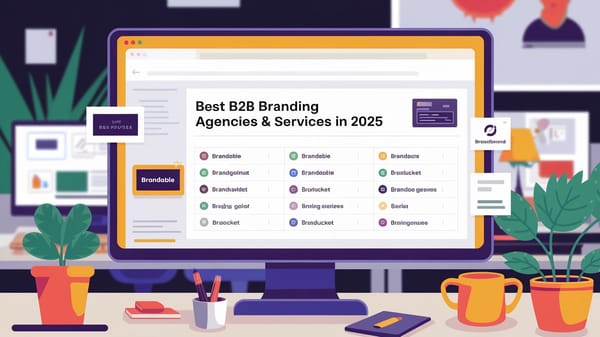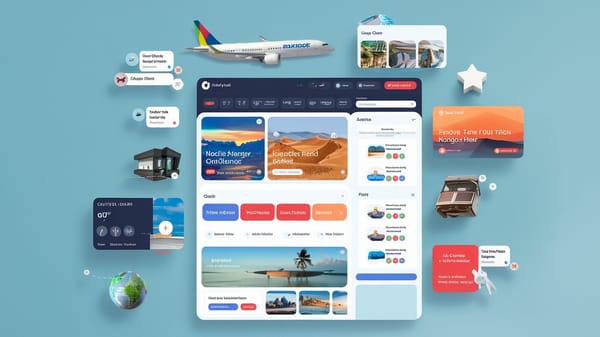7 B2B Marketing Campaigns That Nailed It

In the ever-evolving landscape of B2B marketing, staying ahead of the curve requires not only understanding current trends but also learning from successful campaigns that have set benchmarks in the industry. This report delves into seven exemplary B2B marketing campaigns that have achieved remarkable success, offering valuable insights and strategies that can be adapted to enhance your own marketing efforts.
You can also visit Oncely.com to find more Top Trending AI Tools. Oncely partners with software developers and companies to present exclusive deals on their products. One unique aspect of Oncely is its “Lifetime Access” feature, where customers can purchase a product once and gain ongoing access to it without any recurring fees. Oncely also provides a 60-day money-back guarantee on most purchases, allowing customers to try out the products and services risk-free.
Oncely are hunting for the most fantastic AI & Software lifetime deals like the ones below or their alternatives:

Table of Contents
- Precision in Audience Targeting and Content Personalization
- Strategic Partnerships and Content Marketing
- Leveraging Review Sites for Credibility
- Account-Based Marketing (ABM) Approach
- Creative Social Media Campaigns
- Influencer Marketing in B2B
- Importance of Customer Feedback
- Data-Driven Marketing Strategies
- Conclusion
- Key Strategies and Tactics in B2B Marketing
- Account-Based Marketing (ABM)
- Content Marketing and SEO
- Personalization and AI
- Influencer Marketing
- Data-Driven Marketing and Automation
- Case Studies of Notable B2B Marketing Campaigns
- HubSpot's Inbound Marketing Strategy
- IBM's Watson Campaign
- LinkedIn's "Sophisticated Marketer" Series
- Salesforce's "Trailhead" Learning Platform
- Adobe's "Experience Cloud" Campaign
- Slack's "Frontiers" Conference
- Cisco's "The Network. Intuitive." Campaign
Precision in Audience Targeting and Content Personalization
One of the most effective strategies in B2B marketing is precision in audience targeting and content personalization. A prime example of this approach is Stanley Black & Decker's integration of Pardot into their marketing strategy. By refining their list segmentation and dynamically enhancing their content, they were able to address the specific needs of their audience segments more effectively. This targeted approach streamlined the customer journey, resulting in a 30% reduction in the length of their sales cycle and a significant boost in market share. This case study underscores the importance of precision in audience targeting and content personalization in B2B marketing (OpenSend).
Strategic Partnerships and Content Marketing
Strategic partnerships and content marketing have proven to be powerful tools in B2B marketing. A notable example is the collaboration between Paycor and BrightEdge, which focused on creating valuable content that addressed the needs of their target audience. This included social media posts, podcasts, videos, and blog articles that provided useful information and addressed SEO concerns. By collaborating with B2B industry leaders such as CEOs and subject matter experts, they produced a successful video series highlighting top B2B SEO strategies. This approach generated a wealth of information that created a buzz throughout the B2B community without incurring advertising expenses (B2B Marketing World).
Leveraging Review Sites for Credibility
Utilizing review sites like G2, Capterra, and Sourceforge has become a critical component of B2B marketing strategies, particularly for businesses in the software industry. These platforms are where knowledgeable buyers congregate, seeking credible feedback from other buyers. For instance, QBench, a B2B software company, effectively used these review sites to enhance their marketing strategy. By showcasing credible feedback from other buyers, they were able to build trust and credibility with potential customers, which is crucial in the B2B space (B2B Marketing World).
Account-Based Marketing (ABM) Approach
The account-based marketing (ABM) approach is another successful strategy in B2B marketing. This approach involves tailoring marketing efforts to specific target accounts, personalizing content and messaging to address each account's unique needs and pain points. By focusing on high-value accounts, businesses can create more meaningful and effective marketing campaigns. This strategy has been successfully implemented by various companies, resulting in increased engagement and conversion rates (B2B Marketing World).
Creative Social Media Campaigns
Creative social media campaigns have also played a significant role in successful B2B marketing strategies. These campaigns are designed to boost sales and enhance brand visibility. For example, a creative social media campaign can involve interactive content, engaging visuals, and strategic use of hashtags to reach a wider audience. By leveraging the power of social media, businesses can connect with their target audience on a more personal level, fostering engagement and driving sales (Column Five Media).
Influencer Marketing in B2B
Influencer marketing has emerged as a powerful trend in B2B marketing. The market value for influencer marketing has more than doubled over the last three years, reaching $16.4 billion. Influencers have the ability to reach a wide audience and create a deeper level of connection with potential customers. When an influencer recommends a product or service, their followers are more likely to consider doing business with the brand. This strategy has proven effective in reaching consumers across all demographics and enhancing brand visibility (SFGate).
Importance of Customer Feedback
Customer feedback is crucial in B2B marketing, as it provides valuable insights into customer needs and preferences. By actively seeking and incorporating customer feedback, businesses can improve their products and services, enhance customer satisfaction, and build long-term relationships. This approach not only helps in retaining existing customers but also attracts new ones by demonstrating a commitment to continuous improvement and customer-centricity (Digital Defynd).
Data-Driven Marketing Strategies
Data-driven marketing strategies have become increasingly important in B2B marketing. By leveraging data analytics, businesses can gain insights into customer behavior, preferences, and trends. This information can be used to create more targeted and effective marketing campaigns, optimize marketing spend, and improve overall marketing performance. Data-driven strategies enable businesses to make informed decisions and achieve better results in their marketing efforts (HubSpot).
Conclusion
The success of B2B marketing campaigns lies in the ability to adapt to changing market dynamics and leverage innovative strategies. By focusing on precision in audience targeting, strategic partnerships, leveraging review sites, account-based marketing, creative social media campaigns, influencer marketing, customer feedback, and data-driven strategies, businesses can achieve significant results in their marketing efforts. These case studies provide valuable insights and inspiration for businesses looking to enhance their B2B marketing strategies and drive growth.
Key Strategies and Tactics in B2B Marketing
Account-Based Marketing (ABM)
Account-Based Marketing (ABM) is a strategic approach that focuses on targeting specific accounts rather than a broad audience. This method is particularly effective in B2B marketing, where the decision-making process involves multiple stakeholders. ABM allows marketers to tailor their messaging and campaigns to the unique needs and pain points of each account, thereby increasing the likelihood of engagement and conversion.
According to Markivis, ABM is one of the most effective strategies for reaching decision-makers within target companies. By focusing on high-value accounts, businesses can allocate their resources more efficiently and achieve a higher return on investment (ROI). The use of personalized content and targeted advertising in ABM campaigns can significantly enhance the customer experience and foster long-term relationships.
Content Marketing and SEO
Content marketing remains a cornerstone of successful B2B marketing strategies. It involves creating and distributing valuable, relevant, and consistent content to attract and retain a clearly defined audience. The goal is to drive profitable customer action by establishing the business as a thought leader in its industry.
Search Engine Optimization (SEO) is a critical component of content marketing. By optimizing content for search engines, businesses can improve their visibility and attract more organic traffic. As noted by Eventible, staying ahead of SEO trends is essential for maintaining a competitive edge in the digital landscape. This includes optimizing for voice search, mobile-first indexing, and leveraging AI-driven tools to enhance keyword research and content creation.
Personalization and AI
Personalization is increasingly important in B2B marketing, as it allows businesses to deliver tailored experiences to their audience. By leveraging data and insights, marketers can create personalized content and offers that resonate with individual prospects and customers. This approach not only improves engagement but also builds trust and loyalty.
Artificial Intelligence (AI) plays a crucial role in enabling personalization at scale. AI-powered tools can analyze vast amounts of data to identify patterns and predict customer behavior. This allows marketers to deliver the right message to the right person at the right time. According to Alyce, AI can also enhance targeting, engagement, and conversion rates by automating and optimizing various aspects of the marketing process.
Influencer Marketing
Influencer marketing is not just for B2C brands; it is also a powerful tool in B2B marketing. By partnering with industry influencers, businesses can expand their reach and credibility. Influencers can help amplify a brand's message and connect with a wider audience, particularly in niche markets.
The key to successful influencer marketing in B2B is selecting the right influencers who align with the brand's values and have a genuine connection with the target audience. As highlighted by Markivis, leveraging influencers can improve targeting and engagement, ultimately leading to higher conversion rates.
Data-Driven Marketing and Automation
Data-driven marketing involves using data and analytics to inform marketing decisions and strategies. By analyzing customer data, businesses can gain valuable insights into their audience's preferences, behaviors, and needs. This information can be used to create more effective marketing campaigns and improve overall performance.
Marketing automation is a key component of data-driven marketing. It allows businesses to streamline their marketing efforts by automating repetitive tasks such as email marketing, social media posting, and lead nurturing. Automation not only saves time and resources but also ensures consistency and accuracy in marketing communications.
According to HubSpot, understanding the B2B buyer's journey is essential for implementing effective data-driven marketing strategies. By mapping out the buyer's journey, businesses can identify the most effective tactics for engaging prospects at each stage and driving them toward a purchase decision.
In conclusion, the key strategies and tactics in B2B marketing involve a combination of targeted approaches such as ABM, content marketing, personalization, influencer partnerships, and data-driven automation. By adopting these strategies, businesses can enhance their marketing efforts, improve customer engagement, and achieve greater success in the competitive B2B landscape.
Case Studies of Notable B2B Marketing Campaigns
HubSpot's Inbound Marketing Strategy
HubSpot, a leader in inbound marketing, has effectively utilized content marketing to attract, engage, and delight customers. Their strategy focuses on creating valuable content that addresses the needs and pain points of their target audience. HubSpot's blog, which covers a wide range of topics from marketing to sales and customer service, attracts millions of visitors each month. This content-driven approach has been instrumental in establishing HubSpot as a thought leader in the industry.
In 2023, HubSpot reported a 30% increase in organic traffic, largely attributed to their comprehensive content strategy (HubSpot Annual Report). By offering free tools and resources, such as the HubSpot Academy, they have successfully nurtured leads and converted them into paying customers. This case study highlights the power of content marketing in building brand authority and driving business growth.
IBM's Watson Campaign
IBM's Watson campaign is a prime example of leveraging artificial intelligence to enhance B2B marketing efforts. Watson, IBM's AI platform, was showcased through a series of innovative campaigns that demonstrated its capabilities in various industries, from healthcare to finance. One notable campaign was the "Watson at Work" series, which illustrated how AI could transform business operations.
IBM's strategic use of storytelling and real-world applications helped demystify AI for potential clients. The campaign resulted in a 20% increase in inquiries about Watson's services (IBM Watson Campaign). By focusing on practical use cases, IBM effectively communicated the value of their AI solutions, leading to increased adoption across different sectors.
LinkedIn's "Sophisticated Marketer" Series
LinkedIn's "Sophisticated Marketer" series is a successful example of using educational content to engage B2B audiences. This series includes eBooks, webinars, and podcasts that provide insights into the latest marketing trends and strategies. By positioning themselves as a resource for marketers, LinkedIn has strengthened its brand presence and fostered a community of engaged professionals.
The series has been downloaded over 1 million times, demonstrating its popularity and effectiveness in reaching the target audience (LinkedIn Marketing Solutions). This case study underscores the importance of providing valuable, educational content to build trust and credibility with B2B customers.
Salesforce's "Trailhead" Learning Platform
Salesforce's "Trailhead" is an innovative learning platform designed to educate users on their products and services. By gamifying the learning experience, Salesforce has made it engaging and accessible for users to gain new skills and certifications. This approach not only enhances customer satisfaction but also drives product adoption and loyalty.
Since its launch, Trailhead has attracted over 3 million learners, contributing to a 25% increase in Salesforce certifications (Salesforce Trailhead). This case study highlights the effectiveness of using interactive and gamified content to educate and empower B2B customers, ultimately leading to increased product usage and customer retention.
Adobe's "Experience Cloud" Campaign
Adobe's "Experience Cloud" campaign is a testament to the power of integrated marketing solutions in the B2B space. By showcasing the capabilities of their Experience Cloud platform, Adobe demonstrated how businesses could deliver personalized customer experiences across multiple channels. The campaign included a mix of digital advertising, webinars, and case studies that highlighted successful implementations of the platform.
As a result, Adobe reported a 15% increase in Experience Cloud subscriptions in 2023 (Adobe Experience Cloud). This case study illustrates the importance of demonstrating product value through real-world examples and comprehensive marketing strategies to drive B2B sales.
Slack's "Frontiers" Conference
Slack's "Frontiers" conference is an exemplary case of using events to engage and educate B2B audiences. This annual conference brings together industry leaders, customers, and partners to discuss the future of work and collaboration. By offering a platform for thought leadership and networking, Slack has successfully positioned itself as a key player in the collaboration software market.
The 2023 Frontiers conference attracted over 10,000 attendees, resulting in a 40% increase in enterprise customer inquiries (Slack Frontiers). This case study demonstrates the impact of hosting events to build community, foster relationships, and drive business growth in the B2B sector.
Cisco's "The Network. Intuitive." Campaign
Cisco's "The Network. Intuitive." campaign is a notable example of using technology-driven storytelling to engage B2B audiences. This campaign focused on the capabilities of Cisco's intent-based networking solutions, which leverage machine learning and automation to optimize network performance. Through a series of videos and case studies, Cisco illustrated how their solutions could transform business operations.
The campaign led to a 25% increase in sales inquiries for Cisco's networking solutions (Cisco Campaign). This case study highlights the effectiveness of using storytelling and technology demonstrations to communicate complex solutions to B2B customers, ultimately driving sales and market penetration.





